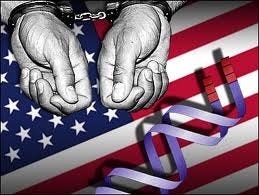U.S. Courts to decide if police can take a persons' DNA without a warrant.

U.S. courts will soon decide whether Americans can have the expectation of privacy over their DNA, reports Kate Moser at the Recorder.
Michael Risher of the ACLU of Northern California is challenging a California law that requires all felony arrestees to give a DNA sample.
He argues that Americans "don't want the government to have all that information about us." The government doesn't have the right to demand our genetic material – including the wealth of personal information it holds – even if it promises to use it only for law enforcement, Risher claims.
Hanni Fakhoury, a lawyer at the Electronic Frontier Foundation who filed a friend of the court brief in the case, says he's concerned about "some of the problems of large-scale data gathering not based on any individualized suspicion that someone is engaged in criminal activities."
That concern is already playing out in terms of the other ways the government collects data on innocent Americans without a warrant.
But there is no indication how mandatory DNA collection will play out as technology brings unprecedented challenges to interpreting the Fourth Amendment's right against unreasonable searches.
Meanwhile, waiting in the wings is the California Supreme Court's review of a state court of appeal panel's forceful decision finding the DNA collection unconstitutional. And the U.S. Supreme Court has telegraphed in the past month that it is likely to take up a criminal case in Maryland that raises the same question.
The lawyer bringing the federal challenge to California's DNA swab law, Michael Risher of the ACLU of Northern California, hopes that the Ninth Circuit will stop the state from adding arrestee DNA to its already sprawling databank of criminal DNA profiles.
"We as Americans don't want the government to have all that information about us," said Risher, who's preparing for the en banc oral arguments set for the week of Sept. 17. Even with the government promising that it won't use the DNA samples — and all of the rich information the genetic material carries with it — for anything beyond law enforcement, Risher said, "that's not the way the Fourth Amendment works."
Chief Judge Alex Kozinski is on record with such deep misgivings over government surveillance, including the inclusion of DNA in a searchable database. In a key case on law enforcement's use of GPS without search warrants, he invoked George Orwell in his strident dissent: "1984 may have come a bit later than predicted, but it's here at last." Those goosebumps over an Orwellian police state go along with the alarm the EFF is sounding.
"We've routinely been concerned about some of the problems of large-scale data gathering not based on any individualized suspicion that someone is engaged in criminal activities," Fakhoury said. "We fear there is a potential for abuse — we fear that because we're losing some of the legal protections that we've had."
And Risher and those concerned about privacy rights say the government's success stories of tracking down violent criminals with hits to its DNA database are few and far between, and the downsides dramatically outweigh them. The database the government will build from DNA samples, they argue, will only exacerbate existing racial disparities in the system, because people who are victims of racial profiling would be overrepresented in the database.
The cheek swab police use to collect the DNA is minimally invasive, said Albert Locher, a Sacramento prosecutor and co-chair of the appellate committee for the California District Attorneys Association, an amicus curiae in the case. It takes less time than even brushing your teeth, he said: "That's the extent of the intrusion here."
And Justice Department officials in California hint at an even bigger legal headache if the DNA collection is unconstitutional, given what they see as the close analogy between DNA and fingerprints.
"That argument would suggest that routing fingerprinting at arrest is unconstitutional," said Daniel Powell, the deputy attorney general arguing in Haskell v. Harris, 10-15152.
Privacy watchers say the fingerprints analogy is all wrong. Fingerprints tell us nothing about who we are; DNA, on the other hand, harbors a wealth of information — on blood types, genetic predispositions, even, some believe, the likelihood for a certain sexual orientation. Risher filed suit in October 2009, along with a team from Paul Hastings. U.S. District Judge Charles Breyer shot down the ACLU's request for a preliminary injunction and concluded the plaintiffs hadn't alleged irreparable harm.
http://www.businessinsider.com/legality-of-dna-collection-2012-8#ixzz24mDJTEtY
http://www.law.com/jsp/ca/PubArticleCA.jsp?id=1202568938355&slreturn=20120729072603


